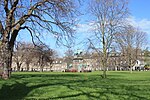James Clerk Maxwell Foundation
1977 establishments in ScotlandBiographical museums in ScotlandCharities based in EdinburghHistoric house museums in EdinburghMuseums established in 1993 ... and 2 more
Organizations established in 1977Use British English from June 2017

The James Clerk Maxwell Foundation is a registered Scottish charity set up in 1977. By supporting physics and mathematics, it honors one of the greatest physicists, James Clerk Maxwell (1831–1879), and while attempting to increase the public awareness and trust of science. It maintains a small museum in Maxwell's birthplace. This museum is owned by the Foundation.
Excerpt from the Wikipedia article James Clerk Maxwell Foundation (License: CC BY-SA 3.0, Authors, Images).James Clerk Maxwell Foundation
India Street, City of Edinburgh New Town/Broughton
Geographical coordinates (GPS) Address Nearby Places Show on map
Geographical coordinates (GPS)
| Latitude | Longitude |
|---|---|
| N 55.9552115 ° | E -3.2057056 ° |
Address
India Street 14
EH3 6EZ City of Edinburgh, New Town/Broughton
Scotland, United Kingdom
Open on Google Maps








